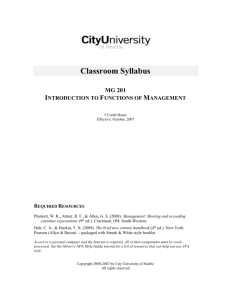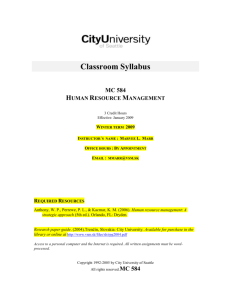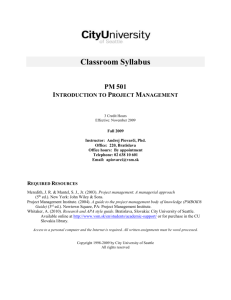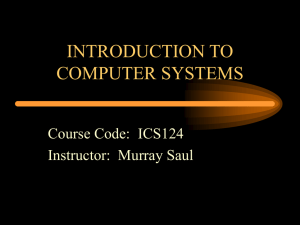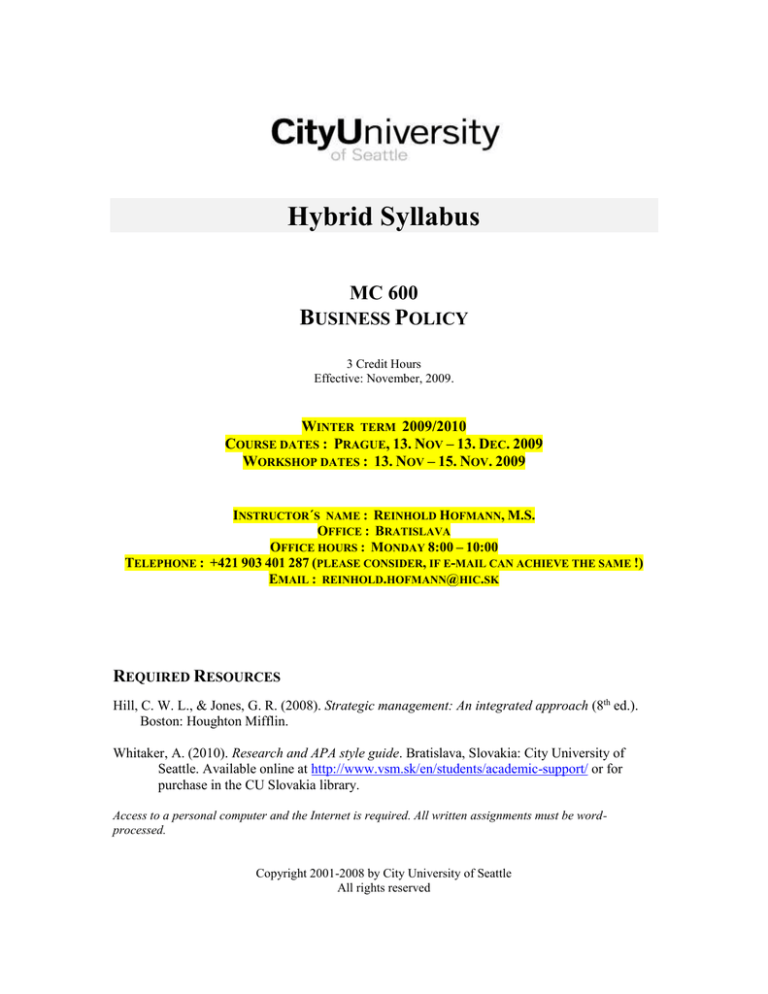
Hybrid Syllabus
MC 600
BUSINESS POLICY
3 Credit Hours
Effective: November, 2009.
WINTER TERM 2009/2010
COURSE DATES : PRAGUE, 13. NOV – 13. DEC. 2009
WORKSHOP DATES : 13. NOV – 15. NOV. 2009
INSTRUCTOR´S NAME : REINHOLD HOFMANN, M.S.
OFFICE : BRATISLAVA
OFFICE HOURS : MONDAY 8:00 – 10:00
TELEPHONE : +421 903 401 287 (PLEASE CONSIDER, IF E-MAIL CAN ACHIEVE THE SAME !)
EMAIL : REINHOLD.HOFMANN@HIC.SK
REQUIRED RESOURCES
Hill, C. W. L., & Jones, G. R. (2008). Strategic management: An integrated approach (8th ed.).
Boston: Houghton Mifflin.
Whitaker, A. (2010). Research and APA style guide. Bratislava, Slovakia: City University of
Seattle. Available online at http://www.vsm.sk/en/students/academic-support/ or for
purchase in the CU Slovakia library.
Access to a personal computer and the Internet is required. All written assignments must be wordprocessed.
Copyright 2001-2008 by City University of Seattle
All rights reserved
MC 600
BUSINESS POLICY
This document provides an overview of the course foundation elements, assignments, schedules
and activities. For information about general City University of Seattle policies, please see the
City University of Seattle catalog. If you have additional questions about the course, please
contact your instructor.
Notification to Students with Disabilities
If you are a student with a disability and you require certain help, please contact the site
administrator as soon as possible.
Scholastic Honesty
City University of Seattle expects each student to do his/her own work. The University has "zero
tolerance" for cheating, plagiarism, unauthorized collaboration on assignments and papers, using "notes"
during exams, submitting someone else's work as one's own, submitting work previously submitted for
another course, or facilitating acts of academic dishonesty by others. The penalties are severe! A first
offense can result in a zero grade for the course and suspension for one quarter; a second offense can result
in a zero grade for the course and suspension for two or more quarters; a third offense can result in
expulsion from the University. The Policy and Procedures may be found at
http://www.vsm.sk/en/students/scholastic-honesty/policies-and-procedures/.
In addition to providing your work to the instructor for grading, you must also submit an electronic copy
for the CU archives (unless the work is specifically exempted by the instructor). You will not receive a
grade for particular work until and unless you submit this electronic copy. The procedure for submitting
work to the archives is to upload it via the website http://www.vsm.sk/en/students/on-linecenter/uploader/uploader.html. Files should include the cover page of the work with the student name,
instructor name, course name and number, and date. File names should indicate the type of assignment,
such as “researchpaper.doc”, “casestudy.doc” or “ thesis.doc” (student name should not be a part of the file
name because the system adds it). All files received into the archives are submitted to www.TurnItIn.com
for plagiarism checking.
COURSE DESCRIPTION
This course serves as the capstone integration course for the MBA program. Students will utilize
prior learning to create a business plan that reflects their competencies in understanding and
applying knowledge and skills reflective of program outcomes. Students will consider strategic
and operational situations and factors, and will demonstrate proficiency in foundational functional
arenas such as management accounting, finance, marketing, economics, etc.
MC 600 SYL Page PAGE 10
Eff: 01/08
Prerequisites: Prior to enrolling in MC 600, students must be in their last quarter of study or have
completed the core MBA degree courses, which are: MB 545, MC 500, MC 506, MC 509, MC
511, MC 514, MC 516, MC 553, MC 555, and MC 550. Any exceptions must have special
permission from the Program Director.
COURSE OVERVIEW
This capstone course for the graduate business administration program focuses on strategy and
“managing for success,” emphasizing the need to formulate plans for the enterprise as a whole,
and manage strategically from a whole systems perspective. Through case analyses, a business
planning project, and exercises in contingency responses, students will have an opportunity to
integrate concepts from previous courses and simulate the tasks a general manager performs.
LEARNING GOALS
Upon the successful completion of this course, students will be able to:
1. Select, integrate, and apply a body of knowledge of business accounting, finance,
governmental and regulatory relationship, international business, marketing, structure, and
management toward the effective management of a business;
2. Apply principles of ethical behavior and social responsibility in business decision-making;
3. Plan business strategies within a global environment;
4. Establish management systems and structures to plan, budget, and control a multi-functional
enterprise to meet deadlines within a defined set of resources over time;
5. Communicate orally and in writing with clarity, persuasiveness and effectiveness;
6. Devise a corporate communication system that applies modern technology in support of a
business’s competitive advantage;
7. Demonstrate an understanding of the interplay among an organization’s goals and its systems,
culture, leadership, and structure to maximize organizational effectiveness;
8. Analyze the development of organizational goals that achieve effectiveness, reflect the
satisfaction of strategic constituencies, and have a socially responsible impact on the
environment;
9. Formulate guidelines for developing effective business strategies for enterprises of various
market or product and service orientations;
10. Assess the relationships between policy decisions in marketing, production, finance,
organization, and management of resources (including human and information) and overall
strategic policy decisions;
11. Critically evaluate strategic organizational issues and options for addressing these issues;
12. Develop a strategic business plan incorporating the issues and topics addressed in the MBA
program.
MC 600 SYL Page PAGE 10
Eff: 01/08
Core Concepts
To achieve the goals of this course, you will need to master the following core concepts:
1. The strategic management process;
2. Stakeholders and the corporate mission;
3. Ethics;
4. External analysis
5. Internal analysis
6. Functional-level strategies;
7. Business-level strategy;
8. Industry environment;
9. Vertical integration, diversification, and strategic alliances;
10. Strategic control systems;
11. Implementing strategy change.
RECOMMENDED SUPPLEMENTARY RESOURCES
As a City University of Seattle student, you have access to library resources regardless of where and how
you are taking this class. To access the resources necessary to complete your coursework, visit the library
menu in the My.CityU portal at https://my.cityu.edu, and the CU Slovakia library home page at
http://library.cutn.sk/.
A good place to begin your research is through the management program resources page in the
My.CityU library. It provides links to relevant journals, books, and Web sites. Search the online
databases for journal, magazine, and newspaper articles. For additional help, visit the Slovakia
library or submit your question in the Contact Us section of the Slovakia library’s web site.
MC 600 SYL Page PAGE 10
Eff: 01/08
OVERVIEW OF COURSE ACTIVITIES AND GRADING
The grade you receive for the course will be derived using City University of Seattle’s decimal
grading system, based on the following:
Assignments
Online participation
Constructive Participation (during workshop)
Executive Digest – Individual Assignment
Oral Presentation of Executive Digest
Strategic Business Plan - Group Assignment
20%
10%
15%
10%
45%
TOTAL
100%
Note: All assignments are due at the beginning of each class identified. Ten percentage points
WILL be deducted from a student’s grade for each assignment that is submitted late.
EXPLANATION OF ASSIGNMENTS AND GRADING
Note that the assignments shown, above, are in the format of a business plan. During this course
you will develop a formal strategic business plan, which is a major effort (40 to 60 pages is not
unrealistic). Your presentations must each be a fully developed, formal, professional business
report. Detailed guidelines will be provided by the instructor. Many additional details will be
provided in class sessions. The requirements are rigorous, therefore attendance is VERY
IMPORTANT. The assistance you receive in class will be extensive, and everything presented in
class must be included if it is relevant to your business plan. This will be an opportunity to
perform much of the initial work and make many of the initial decisions required to bring your
new business into being.
ONLINE PARTICIPATION
A discussion question or other task from your instructor appears weekly in the discussion forum.
Sometimes these will be questions to discuss based on the reading, sometimes you may be asked
to do research and post real-life examples that relate to the course, sometimes you may post your
written work and be required to give feedback on your classmates’ written work, and other times
you may be asked to solve homework problems and post your answers for your classmates to
correct.
In all cases, you are expected to post at least one additional comment each week reacting to
another student’s post. This means that you should have at least 2 posts per week. Please note
that you cannot make all your posts on the same day; post in one topic on at least two different
days.
If online homework is assigned, each student will solve a certain problem(s) to complete and post their
answers on the bulletin board. After posting your calculation or answer, you are expected to post a
response to one other student’s answer. Check another student’s work (each problem should be checked
once) and post whether you think the student’s answer is correct or not, and why. This does not mean you
have to re-do the problem, but rather explain where you think the student made a mistake or where you
would do something differently.
MC 600 SYL Page PAGE 10
Eff: 01/08
This forum is to help promote student-to-student interaction. Your instructor will not be
responding to individual posts, but may enter the discussions with comments, corrections, and
additional questions, and will close each topic. If you have a question or comment that is
specifically for your instructor, email your instructor directly or use the Question & Answer
forum.
After the topic is closed, your participation will be evaluated. Although the tone of your postings can be
informal, your instructor will expect them to be on a professional level. You will be evaluated on
participating regularly, being aware of the issues from the reading, expressing your own ideas clearly,
supporting your ideas, maintaining a respectful and inoffensive tone, thoughtfully reacting to others' ideas,
and using clear and appropriate English.
Grading Criteria for Online Participation (discussion)
Quality of responses (thoughtful, supported, clear)
Quantity of responses (2 relevant responses per topic)
TOTAL
50%
50%
100%
Grading Criteria for Online Participation (homework)
Completion of homework problem(s)
Appropriate response to classmate’s work
50%
50%
TOTAL
100%
CONSTRUCTIVE PARTICIPATION
All participants will be expected to participate during class sessions. This will include timely
completion of reading and weekly assignments prior to attending class. Professional demeanor,
familiarity with the reading assignments, and asking pertinent questions, are examples of
behaviors expected. Constructive participation is also measured by individual participant’s
willingness to ask questions and submit ideas when requested.
Grading Criteria for Constructive Participation
Demonstration of timely presence
Relevance and depth of comments in discussions
Demonstrated familiarity with course content
Quality of questions asked
20%
30%
25%
25%
TOTAL
100%
MC 600 SYL Page PAGE 10
Eff: 01/08
EXECUTIVE DIGEST
Summarize your company's vision and intended strategy, including a description of your
product/service, along with your approach for each of the areas of the business plan you will be
submitting. This will give the instructor an opportunity to give you guidance on your business
plan by the fourth or fifth week of the course. The business planning textbook provides
information on the content of an Executive Digest. (Due after week 2 of the class running)
Grading Criteria for Executive Digest
Clarity of definition of business and mission
Thoroughness of industry analysis
Logic of the sales structure, and analysis of the target market
and competition
Appropriateness of the management structure
Logic and thoroughness of production processes and quality
control
Viability of the strategic position and risk assessment
Logic of milestones
Accuracy and relevance of financial data
Quality of English composition, format, and professional
presentation
10%
20%
15%
TOTAL
100%
10%
10%
5%
10%
15%
5%
STRATEGIC BUSINESS PLAN
You are required to perform sufficient research and analysis toward development of a strategic
business plan. The business plan requires you to synthesize knowledge from all areas of the
business curriculum and apply it to an original plan for a business. A business plan is a written
document detailing all the various strategies to be utilized as well as the operational and financial
aspects of a company. Like a road map, it helps determine where the company is, where it is
going, and how to get to a desired future state. It forces an executive/manager to consider all
aspects of initiating and operating a viable business. It keeps a company in touch with its goals,
potential risks, and rewards. It may be the crucial factor convincing investors or company
management to provide financing.
A good business plan also serves as a communication tool to familiarize sales personnel,
suppliers, and others with the company’s operations and goals. It helps students develop as
managers, providing practice in thinking about competitive conditions, promotional opportunities,
and situations that are advantageous to the business. It saves money and time by focusing
activities, and by establishing control over finances, marketing, and business objectives. Most
importantly it makes one understand the importance of P+S=0 in impacting new or changing
areas of business.
MC 600 SYL Page PAGE 10
Eff: 01/08
Requirements for the Strategic Business Plan
Format:
TITLE PAGE
Include the student’s name and student number, the name of the company, the instructor’s name,
the class title, course number and start date.
TABLE OF CONTENTS
Provide a sequential list and pagination of the sections of the business plan.
EXECUTIVE SUMMARY
Provide a one-page synopsis of the business that summarizes the main points.
MISSION, VISION, GOALS AND OBJECTIVES
Include a statement of the purpose of the business along with a picture of where the business is
going and what future you anticipate for it. Provide goals and objectives and how they will be
achieved.
COMPANY OVERVIEW
Provide a basic description of the company, its structure, management, staffing, all major
stakeholders and strategic alliances, strengths and weaknesses. Include an explanation of global
or international implications for the company. These may be from competitors, suppliers, or
customers, regardless of your intention to compete internationally or not. Explain how you will
address these factors.
PRODUCT STRATEGY
Review the product or service and what makes it unique and competitive. Future research and
development plans, production and distribution are part of the product strategy.
MARKET ANALYSIS AND PLAN
Define the market, the demographics and psychographics of the target customers, competitors'
products or services, and business and environmental risks and opportunities. Delineate the
product concept, pricing, distribution, and communications strategies covered in this section. Be
sure to discuss what industry this company is in, the strengths and idiosyncrasies of the industry,
and the company’s position in the industry.
SOCIAL RESPONSIBILITY
Identify the particular ethical concerns for your industry and business, distinguishing between the
legal and ethical aspects. Explain how you will address these concerns in the business and how
your business will participate as a member of the community in which it is to be located.
FINANCIAL PLAN
Outline the company's capital requirements, sources of funds, profit projections and financial
strategies. What is the financial situation? Is the company profitable? Analyze and demonstrate
your rationale.
MC 600 SYL Page PAGE 10
Eff: 01/08
THE COMPANY’S FUTURE
Describe the future of the company. What strategic decisions does it face now that will affect its
future? What recommendations do you have for the company? What strategies would you use to
implement these recommendations?
Grading Criteria for Strategic Business Plan
Definition of business and competitive arena
Complete elements required for business plan
Clarity and depth of business development plan and justification
Quality and thoroughness of marketing plan
Appropriateness of business organization and management
structure
Soundness of strategy and justification
Professional appearance of the documents and proper grammar,
spelling, punctuation, and syntax
15%
10%
25%
20%
10%
TOTAL
100%
10%
10%
ORAL PRESENTATION
All students will present their business plan general ideas to the class. Visual materials that
support the presentation are required. The format is to be appropriate for a Board of Directors or a
venture capitalist. Additional criteria will be provided by the instructor.
Grading Criteria for Oral Presentation
Clarity and thoroughness of plan content
Professional demeanor
Capacity to handle questions and feedback
Grammar, spelling, punctuation, and clarity of visual
materials
30%
30%
30%
10%
TOTAL
100%
MC 600 SYL Page PAGE 10
Eff: 01/08
Recommended Course Schedule
The schedule for course activities and assignments is below. Adjustments may be made according
to the directions by the instructor. Students are expected to be fully prepared for each class and to
submit assignments ON TIME. Each assignment MUST be completed PRIOR to the class session
for which it is assigned and submitted in class or electronically to the instructor, if you are unable
to attend in person. Just as business professionals are expected to arrive prepared and on-time to
business functions, students are expected to be fully prepared for each class and TO ARRIVE ON
TIME.
SESSION
TOPICS AND ASSIGNMENTS
READINGS
Friday
Introduction to strategic management and planning
The strategic management process
Scenario planning
Preparation for assignments
- Writing an executive digest
- Oral presentations
- Introduction to business plans
Hill & Jones, Chapter 1
Saturday
External analysis
Internal analysis:
Competitive advantage strategies
Functional-level strategy
Competition and business-level strategy
Strategy in high-technology industries
Examples of standards
Benefit of standards
Corporate strategy: Horizontal integration, vertical
integration, and strategic outsourcing
Hill & Jones, Chapters 2-3
Hill & Jones, Chapter 4
Hill & Jones, Chapters 5-6
Hill & Jones, Chapters 7-8
Hill & Jones, Chapters 9-10
DUE: Executive Digest
Hill & Jones, Chapters 11-12
Hill & Jones, Chapter 13
Sunday
DUE: Oral presentations
Corporate performance
Corporate governance
International strategy
Week 1
16.11.
Discussion round 1
Week 2
23.11.
Discussion round 2
Week 3
30.11.
Discussion round 3
DUE: Dec 4th Strategic Business Plan
Week 4
7.11.
Final Discussion round 4
MC 600 SYL Page PAGE 10
Eff: 01/08



